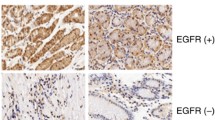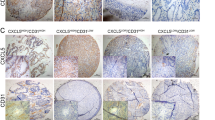Abstract
Overexpression of vascular endothelial growth factor-C (VEGF-C) has been implicated as a critical molecular signal in tumor development by promoting intratumoral lymphangiogenesis. The aim of this study was to explore whether small hairpin RNA (shRNA) targeting VEGF-C could inhibit gastric cancer lymphangiogenesis and tumor growth. Plasmid-mediated expression of VEGF-C–shRNA was employed to silence VEGF-C gene expression in human SGC-7901 cell lines. The inhibition of the target gene expression was quantified by real-time quantitative polymerase chain reaction, Western blotting, and enzyme-linked immunosorbent assay. In vitro, the cell viability was determined by MTT assay, flow cytometry analysis, and migration assay. After VEGF-C knockdown was confirmed, the stable cells were inoculated into nude mice. Tumor growth, lymph vessel density (LVD), and microvascular density were compared for mice administered either VEGF-C–shRNA or control. VEGF-C–shRNA causes effective and specific downregulation of VEGF-C expression (P < 0.05). The migration activity of SGC-7901 cells was attenuated in vitro (P < 0.05). Tumor growth rate and LVD was suppressed in vivo (P < 0.05). VEGF-C–shRNA effectively suppressed gastric cancer cell migration in vivo, retards tumorigenicity, and lymphangiogenesis in nude mice.





Similar content being viewed by others
References
Parkin DM, Bray F, Ferlay J, Pisani P. Global cancer statistics, 2002. CA Cancer J Clin. 2005;55(2):74–108. doi:10.3322/canjclin.55.2.74.
Hohenberger P, Gretschel S. Gastric cancer. Lancet. 2003;362(9380):305–15. doi:10.1016/s0140-6736(03)13975-x.
Kurtz JE, Dufour P. Evolving standards of care in advanced gastric cancer. Future Oncol. 2011;7(12):1441–50. doi:10.2217/fon.11.115.
Lordick F, Schumacher G, Becker-Schiebe M. Gastric cancer—still many questions to be solved. MEMO. 2011;4(2):71–4.
Delaunoit T. Latest developments and emerging treatment options in the management of stomach cancer. Cancer Manag Res. 2011;3:257–66. doi:10.2147/CMR.S12713.
Stoffel A. Targeted therapies for solid tumors: current status and future perspectives. BioDrugs. 2010;24(5):303–16. doi:10.2165/11535880-000000000-00000.
Nagahashi M, Ramachandran S, Rashid OM, Takabe K. Lymphangiogenesis: a new player in cancer progression. World J Gastroenterol. 2010;16(32):4003–12.
Da MX, Wu XT, Wang J, Guo TK, Zhao ZG, Luo T, et al. Expression of cyclooxygenase-2 and vascular endothelial growth factor-C correlates with lymphangiogenesis and lymphatic invasion in human gastric cancer. Arch Med Res. 2008;39(1):92–9. doi:s0140-6736(03)13975-x/j.arcmed.2007.06.021.
Zhu P, Zhang J, Chen Q, Wang J, Wang Y. Expression of vascular endothelial growth factor-C in gastric carcinoma and the effect of its antisense gene transfection on the proliferation of human gastric cancer cell line SGC-7901. Am J Surg. 2012;204(1):78–83. doi:s0140-6736(03)13975-x/j.amjsurg.2011.06.056.
Tsutsumi S, Kuwano H, Shimura T, Morinaga N, Mochiki E, Asao T. Vascular endothelial growth factor C (VEGF-C) expression in pT2 gastric cancer. Hepatogastroenterology. 2005;52(62):629–32.
Karpanen T, Egeblad M, Karkkainen MJ, Kubo H, Yla-Herttuala S, Jaattela M, et al. Vascular endothelial growth factor C promotes tumor lymphangiogenesis and intralymphatic tumor growth. Cancer Res. 2001;61(5):1786–90.
Shi X, Chen G, Xing H, Weng D, Bai X, Ma D. VEGF-C, VEGFR-3, and COX-2 enhances growth and metastasis of human cervical carcinoma cell lines in vitro. Oncol Rep. 2007;18(1):241–7.
Ochi N, Matsuo Y, Sawai H, Yasuda A, Takahashi H, Sato M, et al. Vascular endothelial growth factor-C secreted by pancreatic cancer cell line promotes lymphatic endothelial cell migration in an in vitro model of tumor lymphangiogenesis. Pancreas. 2007;34(4):444–51.
Morita H, Ishikawa Y, Akishima-Fukasawa Y, Ito K, Akasaka Y, Nishimura C, et al. Histopathological predictor for regional lymph node metastasis in gastric cancer. Virchows Arch. 2009;454(2):143–51. doi:10.1007/s00428-008-0717-3.
Gao P, Zhou GY, Zhang QH, Su ZX, Zhang TG, Xiang L, et al. Lymphangiogenesis in gastric carcinoma correlates with prognosis. J Pathol. 2009;218(2):192–200. doi:10.1002/path.2523.
Schoppmann S, Fenzl A, Schindl M, Bachleitner-Hofmann T, Nagy K, Gnant M, et al. Hypoxia inducible factor-1α correlates with VEGF-C expression and lymphangiogenesis in breast cancer. Breast Cancer Res Tr. 2006;99(2):135–41. doi:10.1007/s10549-006-9190-3.
Dias S, Choy M, Alitalo K, Rafii S. Vascular endothelial growth factor (VEGF)-C signaling through FLT-4 (VEGFR-3) mediates leukemic cell proliferation, survival, and resistance to chemotherapy. Blood. 2002;99(6):2179–84.
Moehler M, Mueller A, Hartmann JT, Ebert MP, Al-Batran SE, Reimer P, et al. An open-label, multicentre biomarker-oriented AIO phase II trial of sunitinib for patients with chemo-refractory advanced gastric cancer. Eur J Cancer. 2011;47(10):1511–20. doi:s0140-6736(03)13975-x/j.ejca.2011.04.006.
Grishok A, Tabara H, Mello CC. Genetic requirements for inheritance of RNAi in C. elegans. Science. 2000;287(5462):2494–7. doi:10.1126/science.287.5462.2494.
Pennati M, Millo E, Gandellini P, Folini M, Zaffaroni N. RNA interference-mediated validation of surviving and Apollon/BRUCE as new therapeutic targets for cancer therapy. Curr Top Med Chem. 2012;12(2):69–78. doi:10.1007/978-1-60327-547-7_15.
Harborth J, Elbashir SM, Bechert K, Tuschl T, Weber K. Identification of essential genes in cultured mammalian cells using small interfering RNAs. J Cell Sci. 2001;114(24):4557–65.
Sui G, Soohoo C, el Affar B, Gay F, Shi Y, Forrester WC. A DNA vector-based RNAi technology to suppress gene expression in mammalian cells. Proc Natl Acad Sci USA. 2002;99(8):5515–20. doi:10.1073/pnas.082117599.
Yu JY, DeRuiter SL, Turner DL. RNA interference by expression of short-interfering RNAs and hairpin RNAs in mammalian cells. Proc Natl Acad Sci USA. 2002;99(9):6047–52.
Phalon C, Rao DD, Nemunaitis J. Potential use of RNA interference in cancer therapy. Expert Rev Mol Med. 2010;12:e26. doi:10.1017/S1462399410001584.
Mandriota SJ, Jussila L, Jeltsch M, Compagni A, Baetens D, Prevo R, et al. Vascular endothelial growth factor-C-mediated lymphangiogenesis promotes tumour metastasis. EMBO J. 2001;20(4):672–82. doi:10.1093/emboj/20.4.672.
Enholm B, Paavonen K, Ristimäki A, Kumar V, Gunji Y, Klefstrom J, et al. Comparison of VEGF, VEGF-B, VEGF-C and Ang-1 mRNA regulation by serum, growth factors, oncoproteins and hypoxia. Oncogene. 1997;14(20):2475–83.
Li H, Adachi Y, Yamamoto H, Min Y, Ohashi H, Ii M, et al. Insulin-like growth factor-I receptor blockade reduces tumor angiogenesis and enhances the effects of bevacizumab for a human gastric cancer cell line, MKN45. Cancer. 2011;117(14):3135–47. doi:10.1002/cncr.25893.
Katsuta M, Miyashita M, Makino H, Nomura T, Shinji S, Yamashita K, et al. Correlation of hypoxia inducible factor-1 alpha with lymphatic metastasis via vascular endothelial growth factor-C in human esophageal cancer. Exp Mol Pathol. 2005;78(2):123–30. doi:j.yexmp.2004.11.002/j.yexmp.2004.11.002.
Rao DD, Vorhies JS, Senzer N, Nemunaitis J. siRNA vs. shRNA: similarities and differences. Adv Drug Deliv Rev. 2009;61(9):746–59. doi:j.yexmp.2004.11.002/j.addr.2009.04.004.
Wang Z, Rao DD, Senzer N, Nemunaitis J. RNA interference and cancer therapy. Pharm Res. 2011;28(12):2983–95. doi:10.1007/s11095-011-0604-5.
Polacheck WJ, Zervantonakis IK, Kamm RD. Tumor cell migration in complex microenvironments. Cell Mol Life Sci. 2012. doi:10.1007/s00018-012-1115-1.
Pollard TD, Borisy GG. Cellular motility driven by assembly and disassembly of actin filaments. Cell. 2003;112(4):453–65. doi:j.yexmp.2004.11.002/S0092-8674(03)00120-X.
He M, Cheng Y, Li W, Liu QS, Liu JX, Huang JH, et al. Vascular endothelial growth factor C promotes cervical cancer metastasis via up-regulation and activation of RhoA/ROCK-2/moesin cascade. Cancer. 2010;10:1710. doi:10.1186/1471-2407-10-170.
Su JL, Yang PC, Shih JY, Yang CY, Wei LH, Hsieh CY, et al. The VEGF-C/Flt-4 axis promotes invasion and metastasis of cancer cells. Cancer Cell. 2006;9(3):209–23. doi:j.yexmp.2004.11.002/j.ccr.2006.02.018.
Zhao R, Liu XQ, Wu XP, Liu YF, Zhang ZY, Yang GY, et al. Vascular endothelial growth factor (VEGF) enhances gastric carcinoma invasiveness via integrin alpha(v)beta6. Cancer Lett. 2010;287(2):150–6. doi:j.yexmp.2004.11.002/j.canlet.2009.06.006.
Guo BL, Zhang YF, Luo GQ, Li LC, Zhang JG. Lentivirus-mediated small interfering RNA targeting VEGF-C inhibited tumor lymphangiogenesis and growth in breast carcinoma. Anat Rec Adv Integr Anat Evol Biol. 2009;292(5):633–9. doi:10.1002/ar.20893.
Acknowledgments
This project is supported by the National Natural Science Foundation of China (grant no.: 30960371).
Conflicts of interest
None
Author information
Authors and Affiliations
Corresponding author
Additional information
Jibin Yao and Mingxu Da contributed equally to this work.
Rights and permissions
About this article
Cite this article
Yao, J., Da, M., Guo, T. et al. RNAi-mediated gene silencing of vascular endothelial growth factor-C inhibits tumor lymphangiogenesis and growth of gastric cancer in vivo in mice. Tumor Biol. 34, 1493–1501 (2013). https://doi.org/10.1007/s13277-013-0674-6
Received:
Accepted:
Published:
Issue Date:
DOI: https://doi.org/10.1007/s13277-013-0674-6




